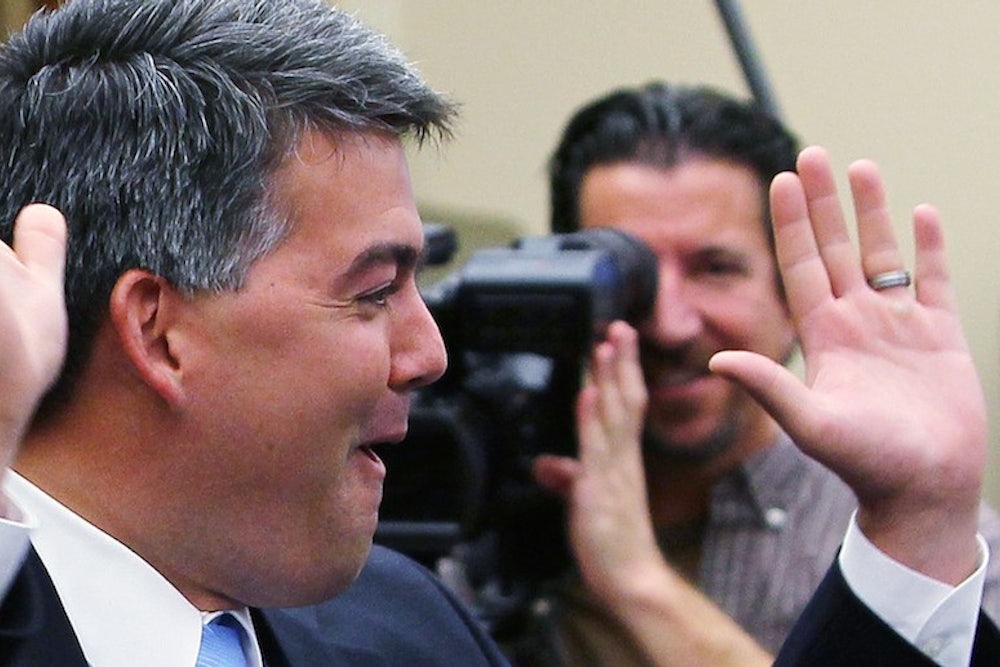Who knew the 2014 midterms—an election that's generated little public interest and is based on little actual policy—would have so much to do with climate change?
The issue has come up in debates across the country this week—in Colorado, Montana, Virginia, and New Hampshire. The Colorado Senate race, particularly, has had a few interesting exchanges. For the second night in a row, Republican Cory Gardner was asked about climate change. For the second night in a row, Gardner stumbled. On Monday, he acknowledged that, “There is no doubt that pollution contributes to the climate changing around us,” but then went on to say he would not act on it. Then, on Tuesday, Gardner refused to answer a yes or no question on whether humans are causing climate change. Insisting the response would be too complicated, he told a (reportedly) pro-Democratic crowd that, "I believe that the climate is changing, I disagree to the extent that it's been in the news." And Gardner isn’t the only Colorado Republican struggling with these issues. During a debate in late September, Mike Coffman, a congressman seeking reelection, got into trouble answering the same question of whether climate change is real. First he said, “No,” then he said, “Don’t know,” during a round of rapid-fire questioning.
Watch video from Tuesday night's debate, where Gardner answered the moderator's question, in front of a booing audience:
As tedious as it may seem to keep reminding Republicans that climate change science really isn’t such a mystery, it’s important that candidates are getting asked for their views. It reveals just how hard the GOP politicians are trying to sound reasonable, even as they reject science. For a while, the clichéd Republican response was “the climate is always changing.” Later it became, "I'm not scientist." Tomorrow it will probably be something else. Reporters should keep asking these questions, and watching Republicans tie themselves into such rhetorical knots. At some point, hopefully, the voters will notice.
—Rebecca Leber
News from Tuesday:
OBAMACARE: Beginning January 1, Wal-Mart will no longer provide health insurance to employees working less than 30 hours a week. Wal-Mart anticipates that this will affect 30,000 of its employees, which is close to 5 percent of its workforce. Similar decisions were made recently by Target, Trader Joe’s and Home Depot. Many of the employees will be better off, because they can get subsidized coverage in the new Obamacare marketplaces, but some won’t. (Hiroko Tabuchi, New York Times)
SAME-SEX MARRIAGE: Gay marriage is now legal in Nevada and Idaho, thanks to a federal appeals court ruling that equal protection rights had been violated by gay marriage bans in the states. A few hours later, the appeals court issued a mandate to allow the Idaho marriages to begin immediately. (Kimberlee Kruesi and Paul Elias, Associated Press)
CLIMATE: Your cup of joe could get pricier soon. Brazil, responsible for a large portion of the world’s coffee bean supply, has another dry season ahead. Research has linked the region’s severe droughts to climate change. (Svati Kirsten Narula, Quartz)
Articles worth reading
Apples and oranges. In a debate with New Hampshire Senator Jeanne Shaheen, Brown compares the child care tax credit to oil industry subsidies. He also says that he’s been pro-contraception “since I was 18.” (Steve Benen, MSNBC)
Longread of the day. Jonathan Chait writes a personal and passionate defense of football.
When the rich stop giving. Danielle Kurtzleben at Vox paints a sobering portrait of declining philanthropy from the wealthy. She opens with the killer line, “Since 2009, a rising economic tide has lifted many yachts.”
More ALEC fallout? It’s still unclear just how much fallout the conservative American Legislative Exchange Council will face from tech companies’ mass exodus. Here’s what one company told Rebecca about why it’s defending its ALEC ties.
Stories we’ll be watching
The Administration has indicated it will be implementing new, tighter Ebola screening procedures at ports of entry. An announcement could come today.
At QED
Brian Beutler reports on the Republican fallout after the Supreme Court decided not to bother hearing challenges to state gay marriage laws, passively legalizing same-sex marriage. Meanwhile, Jen Gunter explains why the medical rationale for the Texas abortion law is bogus. Lastly, Danny Vinik rebuts Leon Panetta’s griping in his memoir that Obama was at fault for defense cuts in the sequester.
Links compiled by Claire Groden and Naomi Shavin.
